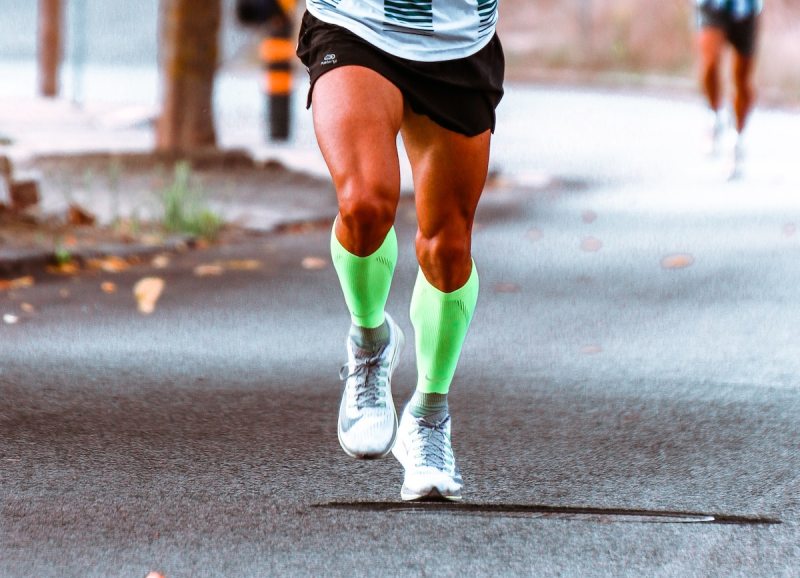
Running is a wonderful recreational running activity for all levels of athletes. Regardless of how long you have been running, even if for years, maybe lately your legs seem heavier. Veins in your calves are suddenly popping out, and your legs cramp up some runs, or possibly worse, after every run. If your legs are constantly cramping, or you’re looking for a more effective way to recover after long runs, the answer to your prayers might be compression socks.
Runners often rely on them to get them through a long-distance run, and nurses and others rely on them to get through a long shift on their feet at work. While there are great benefits of compression socks, knowing exactly what they are is a great starting point in determining if you should add them to your running apparel.
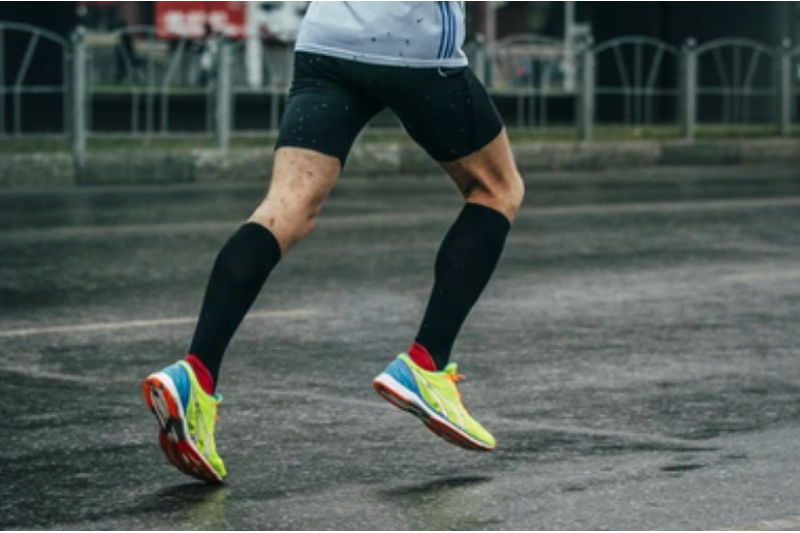
What are compression socks?
Compression socks for runners are high-performance elastic socks that extend up to the knees, providing enhanced support and compression. They are available in two styles: those that stretch from the feet to the knees and those that start at the ankles (known as sleeves. These powerful socks apply pressure to the calves, effectively compressing the surface veins, muscles, and arteries of the legs.
Many wear these socks during long runs, while others wear them to help speed up the recovery process after logging in a substantial number of miles.
Running for extended periods causes swelling. This swelling is natural and not a reason to worry in most cases. If the swelling becomes uncomfortable, a few ways to treat the issue include cold showers, ice packs, taking baths in Epsom salts, or wearing compression socks after long runs.
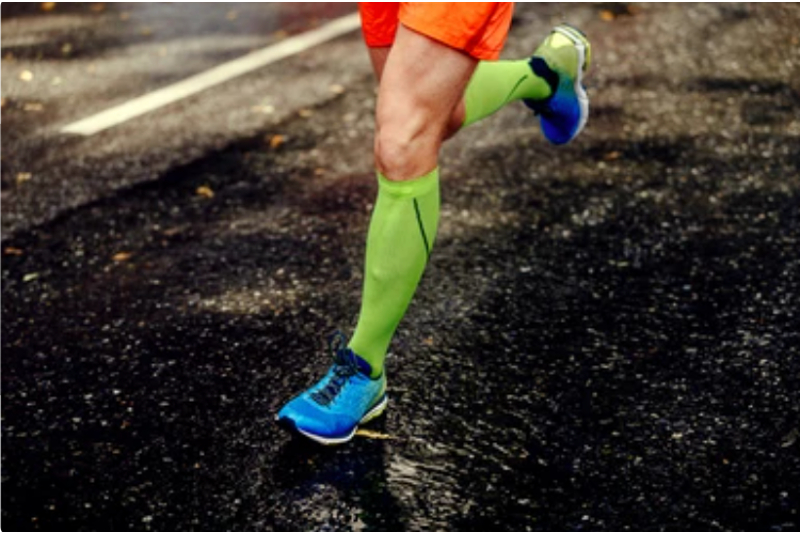
What do compression socks do?
Some runners and athletes swear by compression socks — but how reliable are they? Are these socks scientifically proven to improve your running recovery game, or is it all just a placebo effect?
Compression socks are designed to do just what they describe — compress the blood vessels in your lower legs so your blood and other fluids don’t pool in the lower half of your body. The compression socks apply pressure to your lower legs, which helps maintain blood flow and reduce discomfort and swelling. The compression is the tightest around your ankle, and then it eases up as the socks go higher up your leg.
These socks place constant pressure on the legs to prevent fluid accumulation. The compression aids in blood circulation, allowing more oxygen to get to your tissues. The socks create a positive pressure that forces your blood away from your legs and back up to the heart.
Another benefit of compression socks involves lactic acid production after long or short runs. Whenever you exercise, the body produces lactic acid. Lactic acid is a waste product, and the longer it stays in the muscles, the greater the chance of soreness the next day. Wearing compression socks during and after running helps reduce or avoid soreness.
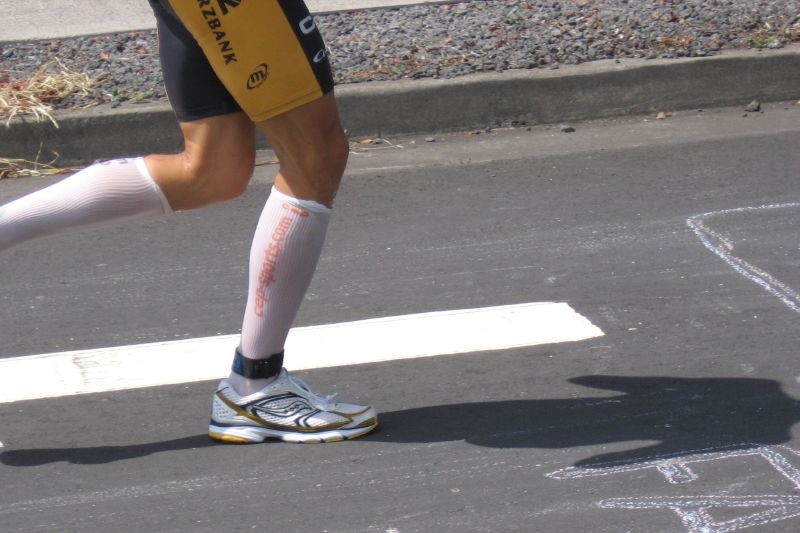
Finding the right size compression socks
Before buying the best compression socks to aid with recovery, remember that sizing is crucial. To ensure the correct fit, try on several pairs at the store. Trying on socks is difficult if you’re ordering online, so consult a size chart and purchase a few different sizes.
To find the correct compression sock size, measure the circumference of the largest part of your calf and the smallest part of your ankle. Measure your feet to get an accurate shoe size, and if you’re between sizes, go with the larger size of compression socks.
Be sure to pay close attention to compression ratings. Compression levels are measured in millimeters of mercury (mmHg) and come in the following levels.
- Less than 15 mmHg: These light compression socks are designed to provide relief from running or standing for extended periods. These socks should be sufficient for most runners.
- 15 to 20 mmHg: These socks provide a little more pressure and will benefit runners after marathons or ultrarunners.
- 20 to 30 mmHg and higher: Typically prescribed by a doctor, these medical-grade compression socks are used to varicose vein issues or worn after surgery to help increase circulation.
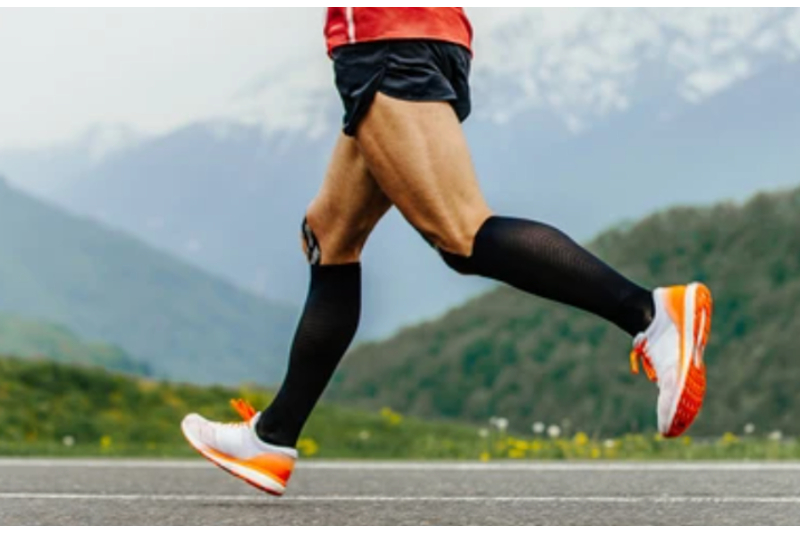
Do compression socks for runners really work?
For runners, compression socks provide relief for muscle aches and foot pain. Studies show that compression socks can help reduce muscle damage and inflammation, especially after marathons and ultramarathons.
A 2015 study in the Journal of Strength and Conditioning Research found that wearing compression socks for 48 hours after a marathon improved performance by 2.6% two weeks after the race.
A few other reasons a runner may adopt compression socks as part of their regular running routine:
- Compression socks keep your legs warm during cold running days. The socks are beneficial for runners who forgo pants and prefer to wear shorts in every season.
- Compression socks add a layer of protection during trial runs and protect your legs from cuts, scratches, dirt, and poison ivy on the trails.
While studies show that compression socks are helpful in recovery, there are currently no studies concluding that wearing compression socks during races is beneficial to performance.
Wearing compression socks during a run or race might make a runner feel better and trick him into thinking he’s running better. If that’s the case, wear compression socks during activity. Just be sure to wear the correct type of compression socks.
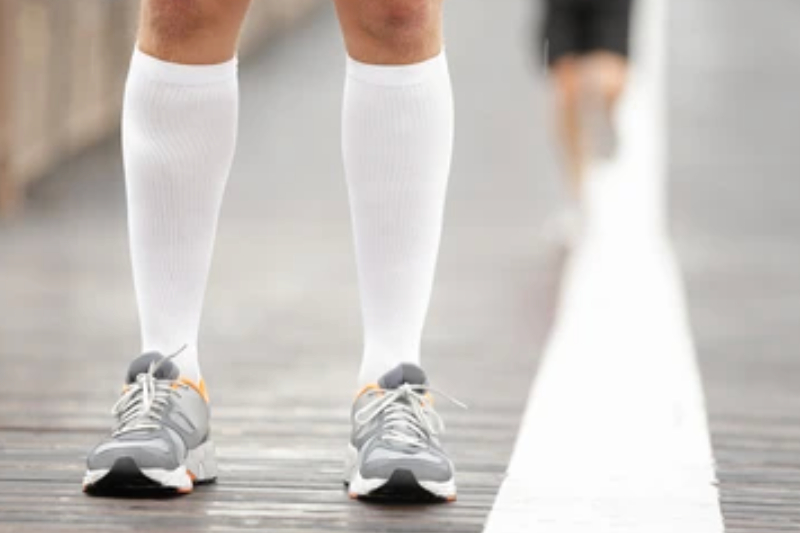
Compression-based athletic gear
Compression therapy has transitioned from being a medical treatment to becoming an essential component of athletic gear in recent years. Professional athletes and recreational runners alike have embraced the use of compression gear, including compression socks, arm bands, and various other items, recognizing their benefits in enhancing performance and aiding in recovery.



